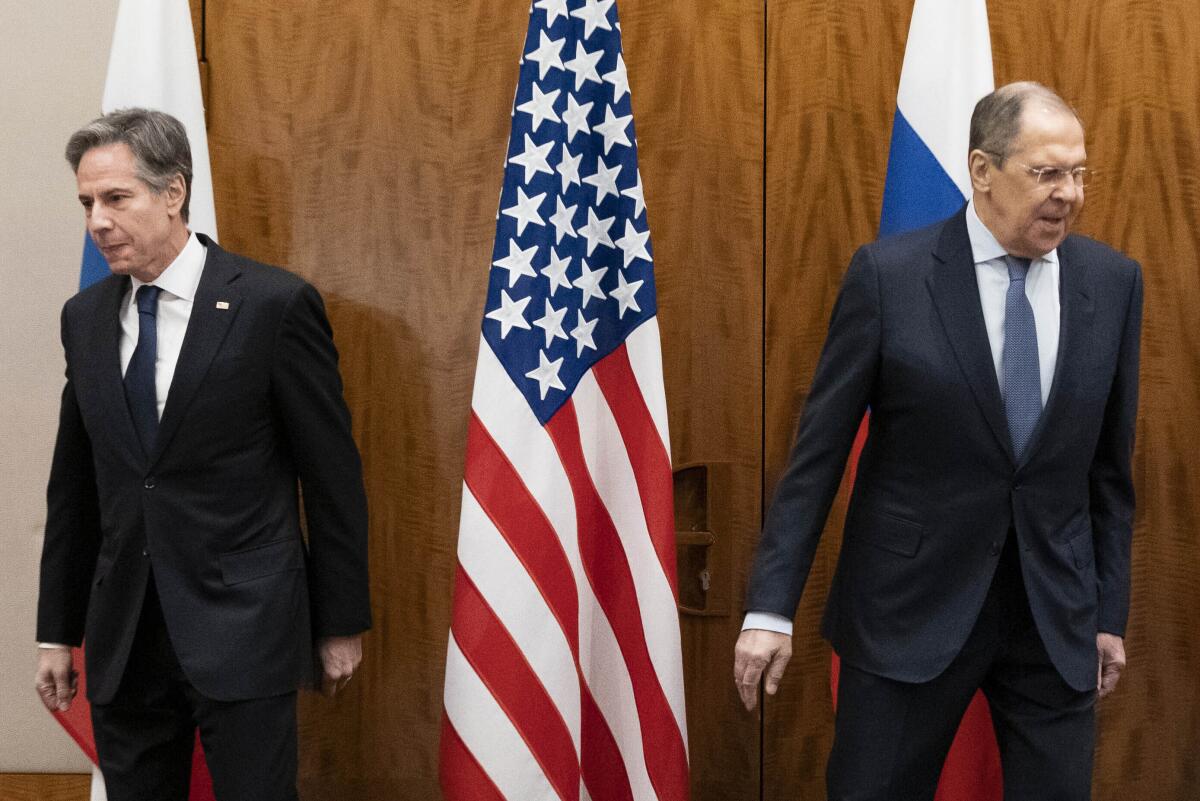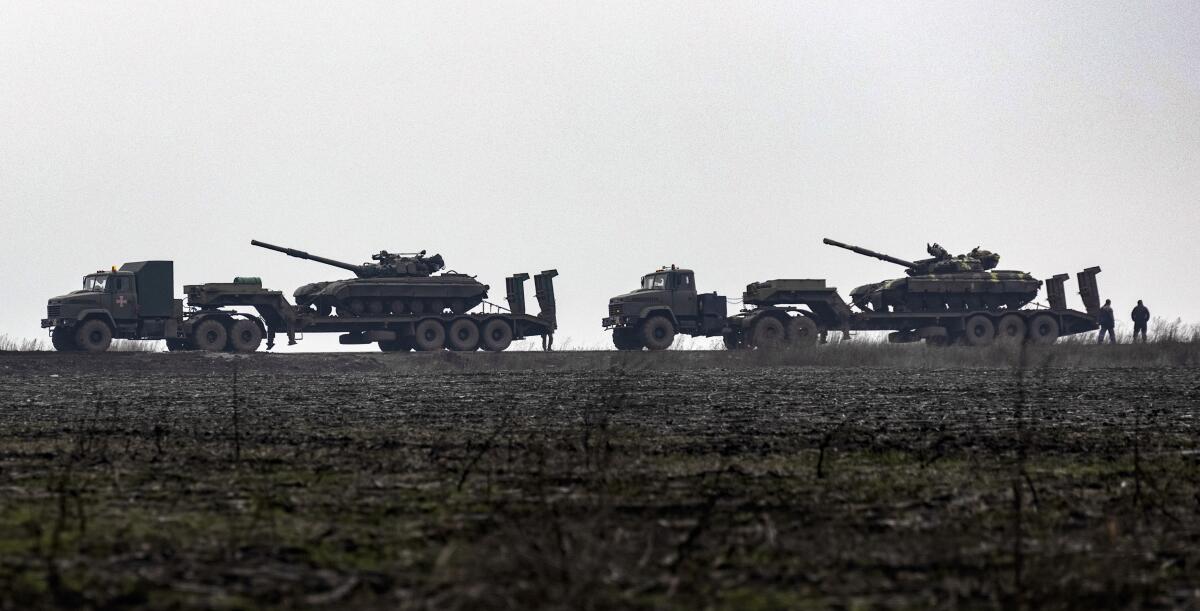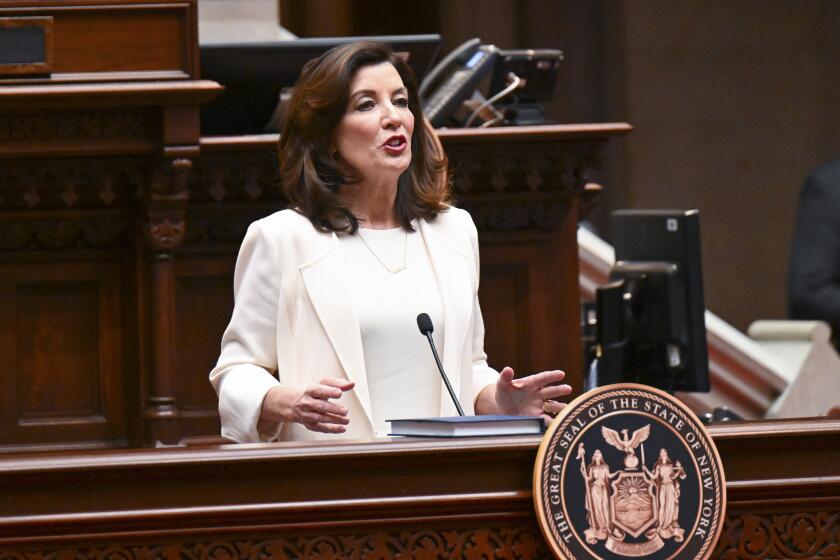In the Ukraine-Russia crisis, Biden bumps against the limits of U.S. power

- Share via
WASHINGTON — In his meandering news conference last week, President Biden repeated, as he often does, a bit of ancient advice from his father: “If everything is equally important to you, nothing is important to you.”
He was referring to his decision to withdraw from Afghanistan, but the maxim also applies to his confrontation with Russian President Vladimir Putin over Ukraine.
For Putin, Ukraine is national security problem No. 1. Without Ukraine as a satellite, Russia is a diminished giant. Ukraine isn’t a military threat to anyone, but a successful democratic government in Kyiv — especially one that yearns to align itself with NATO — would give Russians a dangerous alternative model to Putin’s authoritarian regime.
For Biden, meanwhile, Ukraine is only one of many foreign policy problems, and it’s not the top of his list. The president wants to focus on confronting China and reviving traditional alliances, not defending Kyiv.
That’s why Biden set out early last year to build what he called “a stable and predictable relationship” with Putin; he didn’t want Russia to be a problem.
Putin, alas, had other ideas. “Stable and predictable” didn’t work for him. He doesn’t like a status quo in which Ukraine keeps inching toward the West. Nor does he relish being taken for granted.
The result is an asymmetric crisis. Despite Russia’s denials, Putin’s troop buildup near Ukraine is clearly a threat to invade, but neither the United States nor any other country is willing to use military force in response.

Instead, Biden has warned that an invasion will result in “massive” economic sanctions against Moscow — but as he acknowledged inartfully last week, other NATO countries haven’t agreed on all the details.
When the president added, in a distressingly imprecise Bidenism, that a “minor incursion” by Russia might not draw a massive Western response, that was undeniably a gaffe — one his aides spent the rest of the week trying to clean up.
Gerrymandering remains a significant problem, but so far, Democrats have held their own more than expected. Courts have played a major role.
But it fit Michael Kinsley’s classic definition: “A gaffe is when a politician tells the truth — some obvious truth he isn’t supposed to say.”
By the end of the week, Biden’s misstep, slightly clarified, had become U.S. policy. “Russia has an extensive playbook of aggression short of military action, including cyberattacks [and] paramilitary tactics,” Secretary of State Antony J. Blinken said Friday after meeting with Russia’s foreign minister. Such lesser moves would draw a “calibrated” response, Blinken said.
There are plenty of reasons Germany and other U.S. allies have qualms about massive sanctions on Russia.
For one thing, economic sanctions rarely succeed in changing a country’s behavior — especially when the target is a relatively wealthy country with alternative sources of income.
And measures against Russia “will hurt European countries more than they hurt us,” Douglas A. Rediker of the nonpartisan Brookings Institution warned. “Europe will reluctantly go along with a major sanctions package designed by the United States, but how long is that sustainable?”
If Putin responds by cutting his country’s natural gas deliveries to Europe in midwinter, Germany and other countries will feel immediate pain, he noted.
“Without Russian gas … Europe cannot maintain both heating in homes and existing manufacturing capacity,” he said.
There’s a larger lesson here. The United States is still a superpower, but our ability to influence events overseas is increasingly limited by the growing power of others.
Our domestic political debate hasn’t entirely caught up with that reality. Presidents of both parties still face frequent demands that they address international problems everywhere. But the global expectations forged in the Cold War and the unipolar moment that followed it are unrealistic, as we should have learned in Afghanistan and Iraq.
“The United States is an overstretched hegemon,” foreign policy scholar Hal Brands of Johns Hopkins wrote in Foreign Affairs last week. “Washington has more responsibilities — and more enemies — than it has coercive means.”
More bluntly, we don’t have the resources to fight in Ukraine and Taiwan at the same time.
That mismatch doesn’t merely limit U.S. military options, Brands warned; it also produces “the loss of diplomatic influence in situations short of war…. Leaders in Moscow and Tehran can see that the United States is stretched thin militarily and eager to pay more attention to China.”
One of Biden’s responses to that problem has been to rely on alliances like NATO, but that means — as in the case of Ukraine — he’s constrained by what allies are willing to support.
Eventually, an overstretched superpower has to trim its ambitions, expand its military, or both. But the underlying cause is a mismatch of commitments and capabilities, not a failure of will in the Oval Office — much less a propensity for gaffes.
More to Read
Get the L.A. Times Politics newsletter
Deeply reported insights into legislation, politics and policy from Sacramento, Washington and beyond. In your inbox twice per week.
You may occasionally receive promotional content from the Los Angeles Times.












